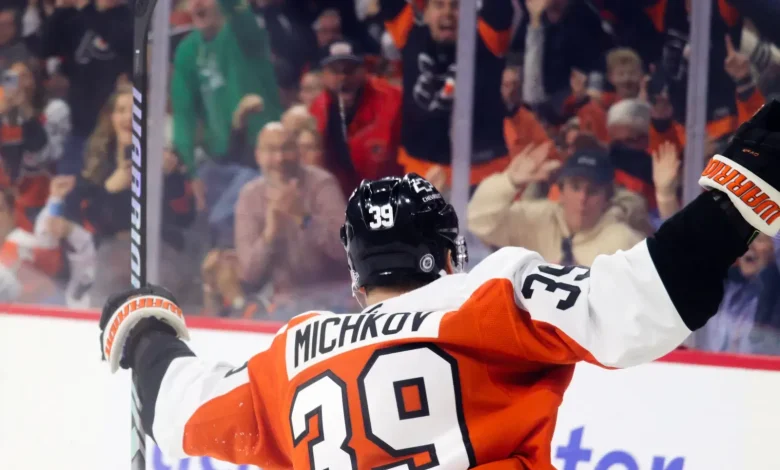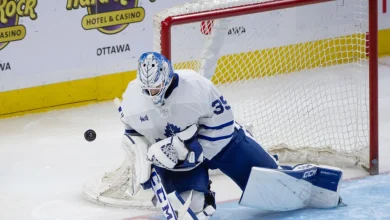How the Flyers Are Guiding Matvei Michkov Through His Sophomore Learning Curve

Matvei Michkov didn’t need anyone to tell him that his start to the season hadn’t been what he hoped for.
The 20-year-old winger, now in his second NHL campaign, is a player who feels the game deeply — every shift, every touch, every mistake. His competitiveness borders on obsessive, and when things don’t click right away, he wears it.
But in Philadelphia, he’s not being left to wrestle with it alone.
The Flyers know exactly what they have in Michkov: an elite offensive talent that’s still learning and growing under a new coach in Rick Tocchet, while still navigating a language barrier and trying to manage the near-impossible expectations fans have set for him as the franchise’s “savior.”
But the Flyers know their young Russian talent still needs those guiding lights, and they’re being deliberate in how they help him learn, both on and off the ice.
A Small Moment That Says a Lot
During Sunday’s practice, Tocchet was working one-on-one with Michkov. As Tocchet explained, Sean Couturier skated over to assist the head coach in making sure Michkov understood what was being communicated to him.
“Right away, Mich was looking at Coots,” Tocchet said afterward. “I can tell that Mich really respects Coots… So I think that’s valuable. Coots has a good way of delivering a message.”
Jordan Hall (@JHallNBCS) on X
Matvei Michkov, Sean Couturier and Rick Tocchet going over things at the whiteboard.
That exchange may have lasted all of two minutes, but it encapsulated the environment the Flyers are trying to build around Michkov. Tocchet knows that learning isn’t just about systems and strategy, but equally about communication and trust. And when a young player like Michkov has a veteran like Couturier reinforcing those lessons, it bridges gaps that no amount of video review can.
“It’s good to have players be almost like an extension of the coaching staff,” Tocchet added. “Especially when you have a language barrier… When somebody’s talking to [Michkov], it’s usually to correct a mistake. It’s hard sometimes.”
The empathy and understanding for Michkov from his head coach is incredibly important, especially with how the 20-year-old winger could feel like every stride of his skates is being picked apart under a microscope. Every shift is parsed, every turnover gets magnified, and every stat line becomes fuel for debate.
The Ottawa Game and the Noise That Followed
After the Flyers’ 3–2 overtime loss to the Senators on Saturday, social media did what social media does best — overreact. Michkov made a few errors, Couturier commented on it postgame—which signaled to the armchair analysts that, naturally, the entire locker room had collapsed.
Flyers fans are notoriously passionate, and sometimes that passion curdles into scapegoating. The reality, though, is more nuanced. Michkov isn’t struggling because he’s disinterested or unwilling to adapt — he’s learning, adjusting, and processing the complexities of an NHL season still so early in his career.
As Tocchet pointed out, “I think he knows now he’s coming into a situation where it’s a team game. It’s not an individual game. There are individual moments, but it’s a team game and it always will be. He’s getting it. He’s playing better every game.”
It’s an important distinction: Michkov isn’t being scolded or sidelined for his learning curve. He’s being taught how to fit his creative instincts within a team structure — something Tocchet knows how to nurture.
A Realistic Reset
Michkov himself has been candid about the process. He displayed admirable maturity and honesty after Saturday’s game against Ottawa, admitting that that was the first time he felt fully rested for an entire game. He also revealed that he took roughly four months off from competition while back home in Russia during the offseason. He kept training, but an ankle issue limited his intensity.
The difference now is that he feels his legs coming back under him. He’s skating with more freedom, making sharper reads, and reconnecting with the poise that defined his breakout rookie year.
Receptive, Coachable, and Learning Fast
Contrary to the caricature painted by certain corners of the hockey rumor mill, Michkov has earned a reputation within the Flyers’ room as a player who listens, asks questions, and genuinely wants to improve. Tocchet and his staff have made a point of building around that.
They’ve worked to simplify his defensive responsibilities, pairing him with linemates who can both support and complement his style. Michkov’s English has improved immensely, to the point where can, in fact, communicate comfortably with teammates (and has Russian-speaking teammates like Rodrigo Abols, Egor Zamula, Nikita Grebenkin to help when needed). And most importantly, they’ve been intentional about how feedback is delivered — constructive, not performative.
The result is a young player who, rather than shrinking under scrutiny, is slowly learning how to channel it into growth. He’s starting to play faster, think cleaner, and rediscover the confidence that makes him so dynamic when he’s at his best.
The Bigger Picture
For Tocchet, the balancing act is ongoing in thoughtfully figuring out a way to push Michkov to adapt without suffocating the creativity that makes him special. It’s the same tension every coach faces with gifted young forwards, and it’s clear the Flyers are committed to getting it right.
And for all the noise surrounding his start, Tocchet said it best: “He’s getting it. He’s playing better every game.”





